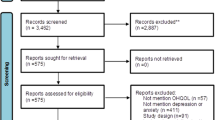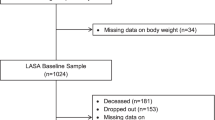Abstract
Aim We assessed the cross-sectional association between depressive symptoms and oral health using a nationally representative sample of older adults aged 50 years and older living in England.
Methods Data came from wave 7 (2014-2015) of the English Longitudinal Study of Ageing. Multiple logistic regression analyses were conducted to assess the association between depressive symptoms, measured through the eight-item Centre for Epidemiologic Studies Depression Scale and three oral health outcomes, namely self-rated oral health, edentulousness and oral impacts.
Results The analytical sample comprised 3,617 individuals. The proportion of participants that reported poor self-rated oral health, being edentate and having at least one oral health impact in the last six months was 19.8%, 7.7% and 8.9%, respectively. Around a tenth of the participants reported having depressive symptoms (10%). All unadjusted associations between depressive symptoms and the oral health measures were statistically significant. However, after accounting for potential confounders, only the relationship between depressive symptoms and self-rated oral health remained significant (OR = 1.38; 95% CI 1.01-1.89). Socioeconomic and general health-related variables appeared to influence the associations between depressive symptoms and oral health, particularly edentulousness and oral impacts.
Conclusion Depressive symptoms were associated with poor self-rated oral health in older English adults.
Key points
-
Highlights the existing evidence of the relationship between depressive symptoms and oral health measures among older adult populations.
-
Using a nationally representative sample of English adults, this study found a significant association between depressive symptoms and self-rated oral health, even after accounting for a number of key potential factors.
-
Emphasises the need for better integration of oral health into primary care, as well as the need to tackle the broader sociodemographic determinants of (oral) health.
This is a preview of subscription content, access via your institution
Access options
Subscribe to this journal
Receive 24 print issues and online access
$259.00 per year
only $10.79 per issue
Buy this article
- Purchase on Springer Link
- Instant access to full article PDF
Prices may be subject to local taxes which are calculated during checkout
Similar content being viewed by others
References
World Health Organisation. Global Health and Aging. 2011. Available at https://www.who.int/ageing/publications/global_health.pdf (accessed October 2020).
Office for National Statistics. England Population Estimates 1971 to 2014. 2015. Available online at https://www.ons.gov.uk/peoplepopulationandcommunity/populationandmigration/populationestimates/adhocs/004359englandpopulationestimates1971to2014 (accessed February 2020).
Government Office for Science. Future of an Ageing Population. 2016. Available online at https://www.gov.uk/government/publications/future-of-an-ageing-population (accessed October 2020).
Age UK. Later Life in the United Kingdom. 2019. Available at https://www.ageuk.org.uk/globalassets/age-uk/documents/reports-and-publications/later_life_uk_factsheet.pdf (accessed October 2020).
World Health Organisation. The Global Burden of Disease: 2004 update. 2008. Available at https://www.who.int/healthinfo/global_burden_disease/GBD_report_2004update_full.pdf (accessed October 2020).
Prince M J, Wu F, Guo Y et al. The burden of disease in older people and implications for health policy and practice. Lancet 2015; 385: 549-562.
Whiteford H A, Degenhardt L, Rehm J et al. Global burden of disease attributable to mental and substance use disorders: findings from the Global Burden of Disease Study 2010. Lancet 2013; 382: 1575-1586.
de Oliveira C, Hirani V, Biddulph J P. Associations Between Vitamin D Levels and Depressive Symptoms in Later Life: Evidence From the English Longitudinal Study of Ageing (ELSA). J Gerontol A Biol Sci Med Sci 2018; 73: 1377-1382.
White J, Zaninotto P, Walters K et al. Duration of depressive symptoms and mortality risk: The English Longitudinal Study of Ageing (ELSA). Br J Psychiatry 2016; 208: 337-342.
Köhler S, van Boxtel M P J, van Os J et al. Depressive Symptoms and Cognitive Decline in Community-Dwelling Older Adults. J Am Geriatr Soc 2010; 58: 873-879.
Murray Thomson W. Epidemiology of oral health conditions in older people. Gerodontology 2014; 31: 9-16.
Griffin S O, Jones J A, Brunson D, Griffin P M, Bailey W D. Burden of oral disease among older adults and implications for public health priorities. Am J Public Health 2012; 102: 411-418.
Heilmann A, Tsakos G, Watt R G. Oral Health Over the Life Course. In Burton-Jeangros C, Cullati S, Sacker A, Blane D (eds) A Life Course Perspective on Health Trajectories and Transitions Life Course Research and Social Policies. pp 39-59. Cham: Springer, 2015.
Kisely S, Baghaie H, Lalloo R, Johnson N W. Association between poor oral health and eating disorders: Systematic review and meta-analysis. Br J Psychiatry 2015; 207: 299-305.
Kisely S, Quek L-H, Pais J, Lalloo R, Johnson N W, Lawrence D. Advanced dental disease in people with severe mental illness: systematic review and meta-analysis. Br J Psychiatry 2011; 199: 187-193.
Kisely S, Sawyer E, Siskind D, Lalloo R. The oral health of people with anxiety and depressive disorders - a systematic review and meta-analysis. J Affect Disord 2016; 200: 119-132.
Cademartori M G, Gastal M T, Nascimento G G, Demarco F F, Corrêa M B. Is depression associated with oral health outcomes in adults and elders? A systematic review and meta-analysis. Clin Oral Investig 2018; 22: 2685-2702.
Arora G, Humphris G, Lahti S, Richards D, Freeman R. Depression, drugs and dental anxiety in prisons: A mediation model explaining dental decay experience. Community Dent Oral Epidemiol 2020; 48: 248-255.
Coles E, Chan K, Collins J et al. Decayed and missing teeth and oral-health-related factors: predicting depression in homeless people. J Psychosom Res 2011; 71: 108-112.
Dahl K E, Calogiuri G, Jönsson B. Perceived oral health and its association with symptoms of psychological distress, oral status and socio-demographic characteristics among elderly in Norway. BMC Oral Health 2018; 18: 93.
Okoro C A, Strine T W, Eke P I, Dhingra S S, Balluz L S. The association between depression and anxiety and use of oral health services and tooth loss. Community Dent Oral Epidemiol 2012; 40: 134-144.
Rouxel P, Tsakos G, Chandola T, Watt R G. Oral Health-A Neglected Aspect of Subjective Well-Being in Later Life. J Gerontol B Psychol Sci Soc Sci 2018; 73: 382-286.
Steptoe A, Breeze E, Banks J, Nazroo J. Cohort Profile: The English Longitudinal Study of Ageing. Int J Epidemiol 2013; 42: 1640-1648.
Tsakos G, Marcenes W, Sheiham A. Cross-cultural differences in oral impacts on daily performance between Greek and British older adults. Community Dent Health 2001; 18: 209-213.
Radloff L S. The CES-D Scale: a self-report depression scale for research in the general population. Appl Psychol Meas 1977; 1: 385-401.
Steffick D E, Wallace R B, Regula A et al. HRS/AHEAD Documentation Report Documentation of Affective Functioning Measures in the Health and Retirement Study. Michigan: University of Michigan, 2000.
Shankar A, McMunn A, Banks J, Steptoe A. Loneliness, Social Isolation, and Behavioural and Biological Health Indicators in Older Adults. Health Psychol 2011; 30: 377-385.
Tsakos G, Demakakos P, Breeze E, Watt R G. Social Gradients in Oral Health in Older Adults: Findings from the English Longitudinal Survey of Aging. Am J Public Health 2011; 101: 1892-1899.
Tsakos G, Sheiham A, Iliffe S et al. The impact of educational level on oral health-related quality of life in older people in London. Eur J Oral Sci 2009; 117: 286-292.
Hybels C F, Bennett J M, Landerman L R, Liang J, Plassman B L, Wu B. Trajectories of Depressive Symptoms and Oral Health Outcomes in a Community Sample of Older Adults. Int J Geriatr Psychiatry 2016; 31: 83-91.
Tsakos G, Marcenes W, Sheiham A. Evaluation of a modified version of the index of Oral Impacts On Daily Performances (OIDP) in elderly populations in two European countries. Gerodontology 2001; 18: 121-130.
Wu S, Wang R, Zhao Y et al. The relationship between self-rated health and objective health status: A population-based study. BMC Public Health 2013; 13: 320.
Baćak V, Ólafsdóttir S. Gender and validity of self-rated health in nineteen European countries. Scand J Public Health 2017; 45: 647-653.
Pitiphat W, Garcia R I, Douglass C W, Joshipura K J. Validation of self-reported oral health measures. J Public Health Dent 2002; 62: 122-128.
Author information
Authors and Affiliations
Corresponding author
Electronic supplementary material
Rights and permissions
About this article
Cite this article
Venturelli, R., Blokland, A., de Oliveira, C. et al. Oral health and depressive symptoms: findings from the English Longitudinal Study of Ageing. Br Dent J (2021). https://doi.org/10.1038/s41415-021-2603-1
Received:
Accepted:
Published:
DOI: https://doi.org/10.1038/s41415-021-2603-1



